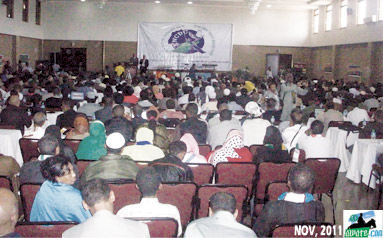Monitoring Group Finds The Smoking Gun On Eritrean Regime
 A 400+ page report of the Monitoring Group on Somalia and Eritrea, which was made public today, states that the Eritrean regime, far from complying with UN Security Council Resolution 1907, is actually engaged in more brazen and reckless behavior that threatens to destabilize the entire Horn of Africa, and beyond. The report, which was finalized on June 20th and submitted to the UN Sanctions Committee, was sent to the Security Council on July 17th.
A 400+ page report of the Monitoring Group on Somalia and Eritrea, which was made public today, states that the Eritrean regime, far from complying with UN Security Council Resolution 1907, is actually engaged in more brazen and reckless behavior that threatens to destabilize the entire Horn of Africa, and beyond. The report, which was finalized on June 20th and submitted to the UN Sanctions Committee, was sent to the Security Council on July 17th.
The Monitoring Group accurately describes the Eritrean regime as a clique where “power is concentrated in the hands of individuals rather than institutions” who “depend more heavily on political and economic support from foreign Governments and diaspora networks than from the populations” within its borders.
The Monitoring Group says that notwithstanding the Eritrean regime’s claims that its involvement in Somalia is based on humanitariasm, or motivated by desire to bring about a lasting solution in Somalia, its “continuing relationship with Al-Shabaab, for example, appears designed to legitimize and embolden the group rather than to curb its extremist orientation or encourage its participation in a political process.” Al-Shabab is a terror group which has pledged its allegiance to Al Qaeda and taken credit for the July 11, 2010 Kampala bombing during the FIFA World Cup, which killed 74 and injured 70 innocent Africans.
Moreover, says the report, the Eritrean regime’s “involvement in Somalia reflects a broader pattern of intelligence and special operations activity, including training, financial and logistical support to armed opposition groups in Djibouti, Ethiopia, the Sudan and possibly Uganda in violation of Security Council resolution 1907 (2009).”
The Eritrean regime’s support for armed groups—specifically forbidden by Resolution 1907—has continued and intensified. In Djibouti, the Eritrean regime is supporting the hitherto defunct FRUD. In Ethiopia, the Eritrean regime is supporting a myriad of armed groups including the Ogaden National Liberation Front (ONLF), the Oromo Liberation Front (OLF), the Afar Liberation Front, the Afar Revolutionary People’s Democratic Front (also known as Ugugumo), the Sidamo Liberation Front, the Tigrayan People’s Democratic Movement and other “unidentified fighters from the Amhara and Gambella regions of Ethiopia.” In Somalia, the Eritrean regime is supporting Al-Shabab. In Sudan, it has a human and arms smuggling arrangement with the country’s Minister of Transportation; in South Sudan, it is supporting the armed groups of South Sudanese rebels Athor and Gadet.
The reason the report is over 400 pages is the detailed documentation of what “support” means. “Support” to the outlaw Eritrean regime means training, arming and financing armed groups.
Whereas all the support the regime provides armed groups can be rationalized by skeptics as standard activities of hostile neighbors, what is likely to place the Eritrean regime in the cross-hairs of the UN is the same one that resulted in unanimous condemnation of the Eritrean regime by a regional body, IGAD, just last month: its decision to target civilian centers in Addis Abeba. The Monitoring Group places the entire responsibility for this terrorist plan on the Eritrean regime:
“Although ostensibly an OLF operation, it [the attempted bombing of the African Union building in Addis Abeba] was conceived, planned, supported and directed by the external operations directorate of the Government of Eritrea, under the leadership of General Teí’ame. If executed as planned, the operation would almost certainly have caused mass civilian casualties, damaged the Ethiopian economy and disrupted the African Union summit.”
The Monitoring Group manages to answer, credibly, the one question that has given pause to skeptics; namely, how does an extremely poor country like Eritrea manage to provide the arms and financing for so many disparate groups? The answer: the Eritrean regime is not a government but a mafia-like organization. The country is governed by an “opaque network of senior party, military and intelligence officials”, and decisions are made in a “highly personalized and often clandestine manner” and therefore, “the necessary resources are mobilized and managed” in “informal and routinely illicit ways.”
Much of what is in the report is detailing the “illicit ways” which include use of Eritreans with dual nationality; foreigners appointed “honorary ambassador;” corrupt government officials of neighboring countries; direct cash funding from Qatar and Libya; and money laundering business fronts for the regime’s intelligence services. The question posed by the Eritrean strongman and his henchmen repeatedly—“where is the evidence?”—has been answered in words, pictures and even an audio recording of one of Isaias Afwerki’s generals coordinating a terrorist activity.
The Monitoring Group makes the following five recommendations:
(a) The Security Council should consider encouraging Member States to introduce rigorous due diligence guidelines for international financial institutions, including multinational banks, which handle funds or host correspondent accounts for Eritrean banks, embassies of Eritrea, PFDJ entities or affiliates, and request them to cooperate with the Monitoring Group in its investigations;
(b) The Security Council should consider encouraging Member States to introduce rigorous due diligence guidelines for mining companies operating in Eritrea with respect to payment of taxes and royalties, and any other form of revenue accrued from mining production, to the Government of Eritrea in order to prevent the use of such funds in violation of relevant Security Council resolutions;
(c) National Governments should demand that the Government of Eritrea cease to violate the Vienna Convention on Consular Relations through the collection of extraterritorial taxes by its diplomats, and should examine domestic legislation to determine whether the collection of funds by party agents or community “wardens” in their territories is in fact legal — especially where it is accompanied by intimidation or coercion— and, if not, instruct law enforcement authorities to take appropriate action;
(d) National Governments should consider waiving Eritrean privileges and immunities under the Vienna Convention, until the Government of the State of Eritrea officially acknowledges and enacts its own responsibilities under the Convention, principally to prevent the illicit transfer of PFDJ funds via diplomatic pouch;
(e) National law enforcement and intelligence agencies, especially in the East African region, should sensitize their personnel to the potential threat posed by the Eritrean external operations directorate, assign higher priority to monitoring its activities, and enhance information-sharing with their partners.
Related Stories
1.https://awate.com/unsc-should-extend-stiffen-sanctions-against-eritrean-regime/
2.https://awate.com/un-monitoring-group-provides-damning-report-on-eritrean-regime/



Awate Forum